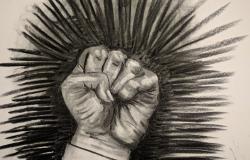From Sexual Harassment to Everyday Sexism – A feminist in Oxfam reflects on International Women’s Day

This guest post on the 'From Poverty to Power' blog by Nikki van der Gaag, Oxfam’s Director of Gender Justice and Women’s Rights.
This International Women’s Day feels different to any other for many working in the aid and humanitarian sector.
Normally, it is a day where, like so many others, we celebrate women’s individual and collective achievements. But the reports of the appalling sexual exploitation of Haitian women by Oxfam staff in the aftermath of the earthquake in 2011, and the subsequent emerging widespread scale of sexual harassment and abuse across the sector, have made it hard to feel like celebrating.
Instead, for many of us, it is a time for self-reflection, for listening and speaking out, and for recognising what many feminists already knew – that in big institutions such as the UN and INGOs and other charities, men still hold the power as much as in the media or Hollywood, the Church or the judiciary.
As we have seen very clearly, Haiti was not an isolated incident. We know that sexual exploitation by the powerful of the powerless is all too common in our own sector as elsewhere. For example, in the past 12 years there have been almost 2,000 allegations of sexual abuse and exploitation by UN personnel. As early as 2004, Amnesty International reported that under-age girls were being kidnapped, tortured and forced into prostitution in Kosovo. The U.N.’s department of peacekeeping in New York acknowledged at that time that “peacekeepers have come to be seen as part of the problem in trafficking rather than the solution.”
Much of the media focus recently has been on the behaviour of individuals, and on the contexts in which they have exploited the most vulnerable in the most appalling way, and the way in which this has been handled. But there is another factor that has been implicit rather than explicit, and that is the mix of gender and power.
As Antonio Guterres, the United Nations Secretary General, said at the start of last year’s 16 days of activism against gender-based violence: ‘Violence against women is fundamentally about power. It will only end when gender equality and the full empowerment of women is a reality.’
All over the world, women continue to face abuse, violence, discrimination and sexual harassment. The horrifying statistic that one in three women worldwide face violence from an intimate partner is often quoted but changes very little from year to year.
Many brave women die for speaking out – Jo Cox in the UK, Gauri Lankesh in India, Berta Caceres in Honduras.
And thousands more are raped, trafficked, sexually exploited or harassed.
This will not end until we address the roots of gender inequality and the many factors beyond gender that keep such power relations in place – among them race, ethnicity, class, geography, age, ability, and sexual orientation.
For change to be visible and felt, there needs to be a structural as well as a cultural revolution. Within our own organisations, we need to ensure that women feel safe to speak out, and that everyone knows that abusive and bullying behaviour will not be tolerated and that any allegations will be responded to quickly and clearly.
We need to make sure that when perpetrators are caught they are punished. Robust and accountable codes of conduct, investing in safeguarding teams as well as good safeguarding policies, a register of referees, are all vital if we are to see change. While Oxfam has made substantial improvements to our safeguarding since 2011, we recently announced a 10 point action plan to further strengthen and improve these measures, including the creation of an Independent Commission to review our culture and practices.
More women in positions of power are a part of the solution, though not all of it. Women still only make up 22.8 % of parliamentarians globally. And a UN study of women’s participation in peace processes found that women make up only 9% of negotiating delegations, 4% of signatories, and 2% of chief mediators.
This is despite the evidence that Analysis of 181 peace agreements signed between 1989 and 2011 found that…‘peace processes that included women as witnesses, signatories, mediators, and/or negotiators demonstrated a 20% increase in the probability of an agreement lasting at least two years. This increases over time, with a 35% increase in the probability of a peace agreement lasting 15 years.’
But processes alone are not enough – it’s the attitudes and behaviours that allow such thing to happen in the first place that need to shift. Sometimes the more subtle forms of discrimination are the hardest to root out – the everyday sexisms that are tolerated and remain hidden simply because they are so routine.
For this to change we will need a real shift in ourselves and in our organisations. And this means not only working with women, or the most marginalised, but with men and boys and those in power as well. Most men do not rape or exploit or abuse women, and those who do must be punished. But men in power may be sexist or discriminatory or both. Working with men, especially young men, to understand sexist or discriminatory behaviour is a critical part of addressing the power imbalance that can sometimes lead to the kind of sexual exploitation that has been revealed so starkly in the past months.
Finally, we need to use this spotlight on our sector positively. It’s an opportunity to redouble our efforts to promote gender equality, social justice and women’s rights, both inside and outside our organisations. To challenge those who see women as less worthy or capable than men. To be more inclusive and diverse. To listen to women and girls so we can help create more space for women and women’s organisations all over the world. To challenge the individuals and institutions that perpetuate privilege, and to ensure that those who exploit their power, whoever and wherever they are, do not get away with.
I believe we can seize this moment to build the change that feminists in our sector and elsewhere have long wanted to see. Perhaps then by International Women’s Day in 2019, we will truly have cause to celebrate.
This post first appeared on:
Image credit: Giulia Forsythe via Flickr (CC BY 2.0)



